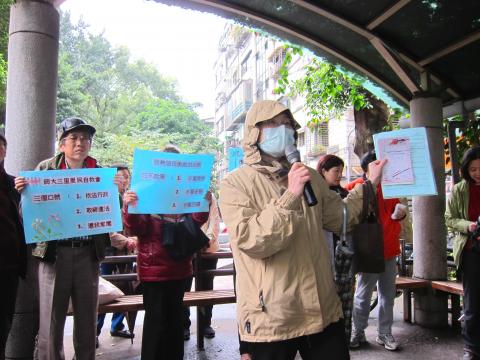Amid an ongoing dispute over the legitimacy of vendors operating in Taipei’s Shida Night Market, a local residents’ self-help association yesterday dismissed the vendors’ latest pledge to maintain a clean environment, insisting that their demand for illegal businesses to leave the neighborhood remained unchanged.
More than 400 vendors in the night market recently signed a joint pledge of self-restraint to reduce air and noise pollution, and presented the pledge to the Taipei City Government yesterday.
In the pledge, vendors promised to move closing hours to 11pm, take responsibility for cleaning up the roads and collecting garbage after closing the stores, keeping the music and their voices down and installing more facilities to prevent air pollution.

Photo: Tsai Wei-chi, Taipei Times
However, the vendors’ latest efforts to keep their businesses from being shut down amid a recent crackdown on illegal businesses in the night market did not receive a positive response from local residents.
“Those vendors have been ignoring the law by operating illegally in the area and they are in no position to sign any pledges. Our demand that illegal businesses leave the neighborhood will not change,” association director Liu Chen-wei (劉振偉) said.
Liu also dismissed the city government’s issuing of questionnaires to neighborhood residents to seek their opinion on dealing with the vendors and urged the city not to side with the vendors.
Taipei City Government spokesman Chang Chi-chiang (張其強) said the city’s goal of maintaining a safe and quiet environment for residents remained and while the vendors’ pledge to maintain a clean and quiet environment was welcomed, it would not affect the city’s plan in handling the issue.
“We will continue to demand area vendors follow the regulations, and the city government will hold more public hearings with vendors and residents. Hopefully they can reach a consensus,” Chang said.
Disputes over the night market began after Taipei Mayor Hau Lung-bin (郝龍斌) announced in November last year that expansion of the market would not be allowed following a growing number of complaints from residents about the garbage and noise produced by vendors and customers.
In addition to noise and air pollution, some vendors have also violated regulations, as their locations are classified as residential zones. According to the city’s land-use bylaws, roads less than 6m wide in residential zones cannot be used for commercial purposes.

The Ministry of Economic Affairs has fined Taobao NT$1.2 million (US$36,912) for advertisements that exceed its approved business scope, requiring the Chinese e-commerce platform to make corrections in the first half of this year or its license may be revoked. Lawmakers have called for stricter enforcement of Chinese e-commerce platforms and measures to prevent China from laundering its goods through Taiwan in response to US President Donald Trump’s heavy tariffs on China. The Legislative Yuan’s Finance Committee met today to discuss policies to prevent China from dumping goods in Taiwan, inviting government agencies to report. Democratic Progressive Party Legislator Kuo Kuo-wen (郭國文) said

The Ministry of Economic Affairs has fined Taobao NT$1.2 million (US$36,900) for advertisements that exceeded its approved business scope and ordered the Chinese e-commerce platform to make corrections in the first half of this year or its license would be revoked. Lawmakers have called for stricter supervision of Chinese e-commerce platforms and more stringent measures to prevent China from laundering its goods through Taiwan as US President Donald Trump’s administration cracks down on origin laundering. The legislature’s Finance Committee yesterday met to discuss policies to prevent China from dumping goods in Taiwan, inviting government agencies to report on the matter. Democratic Progressive Party

Taiwan and its Pacific ally Tuvalu on Tuesday signed two accords aimed at facilitating bilateral cooperation on labor affairs, according to Taiwan’s Ministry of Foreign Affairs (MOFA). The governments inked two agreements in Taipei, witnessed by Foreign Minister Lin Chia-lung (林佳龍) and visiting Deputy Tuvaluan Prime Minister Panapasi Nelesone, MOFA said in a news release. According to MOFA, the agreements will facilitate cooperation on labor issues and allow the two sides to mutually recognize seafarers’ certificates and related training. Taiwan would also continue to collaborate with Tuvalu across various fields to promote economic prosperity as well as the well-being of their

Sung Chien-liang (宋建樑), who led efforts to recall Democratic Progressive Party (DPP) Legislator Lee Kun-cheng (李坤城), was released on bail of NT$80,000 today amid outcry over his decision to wear a Nazi armband to questioning the night before. Sung arrived at the New Taipei District Prosecutors’ Office for questioning in a recall petition forgery case last night wearing a red armband bearing a swastika, carrying a copy of Adolf Hitler’s Mein Kampf and giving a Nazi salute. Sung left the building at 1:15am without the armband and covering the book with his coat. Lee said today that this is a serious